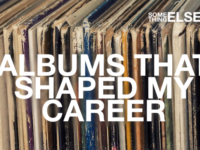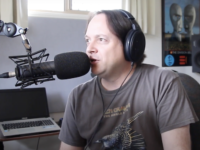Forever associated with “She Blinded Me With Science,” Thomas Dolby quickly moved well outside of that MTV-era hit’s new wave experimentation.
He would, in fact, go on to dabble in everything from the jazz-influenced songcraft of Flat Earth in 1984 to the goofball funk of 1988’s Aliens Are My Buick, from the folky Astronauts and Heretics in 1992 to the post-modern balladry of his newest EP, Oceanea — some of Dolby’s first new music in almost two decades. That’s lent his career this uncommon, very personal integrity – even if people still introduce themselves only for the opportunity to yell “SCIENCE!” at the top of their lungs.
[ONE TRACK MIND: Thomas Dolby talks about writing a tune with Michael Jackson in mind, his role in hit music by Foreigner and Def Leppard and the unjustly ignored genius of Prefab Sprout.]
During his extended time away from music, Dolby nurtured a parallel interest in, ahem … science. He helped develop the cellphone ringtone, the RMF file extension for Internet downloads and, most recently, a transmedia online game that pairs with his forthcoming long player, The Map of the Floating City. That title is a tip of the hat to his current recording studio, housed on the English shore aboard a customized lifeboat powered entirely by solar and wind power.
Up next for Dolby: A series of short U.S. visits in October to talk about the new game, followed by the release of Floating City and then a full tour through the UK, Europe and the States to commence through 2012. But first, in the latest SER Sitdown, Dolby chatted about what’s turned out to be a fascinating career and, yes, about “She Blinded Me With Science” …
Nick DeRiso: I imagine that your relationship with the song “She Blinded Me With Science” has changed over the years – especially as your music shifted away from synth- and sample-driven new wave sounds.
Thomas Dolby: I still have a good relationship with that song. I have to play it, of course, but I don’t mind playing it. Most of the music wasn’t as electronic as “Science,” of course. It was very shortly thereafter that I was recording stuff that was very organic. If you look at my body of work as a whole, I tend to use whatever musical idiom is necessary. I get stimulated by working within a new genre. “Science” was one example of that.
DeRiso: How has working on a lifeboat changed the way you write? There seems to be a renewed sense of motion, this sort of wandering spirit on the new EP.
Dolby: I’ve got a 360-degree view out of the wheelhouse of my lifeboat, with the north sea on one side and a marsh on the other. I’m quite close to a container port, and you see these ships going by all the time. When the light is just right, it looks like an arpeggio of moving cities. It’s fascinating. People come to see me in the lifeboat, and they say: “I wouldn’t get any work done. I’d just be staring out of the window.” But that’s my work. Getting the music down isn’t the hard part, it’s the inspiration.
[SOMETHING ELSE! REWIND: ‘Oceanea’ connects on an emotional level that much of Thomas Dolby’s work from two decades ago never aspired to.]
DeRiso: Your songs, over the years, have done much to illuminate our personal struggles through wartime, and our sometimes uneasy relationship with technology. What brings you to those places?
Dolby: Of course, to an artist, technology is exciting because it opens up new avenues to stimulate the imagination. I love the early history of technology, in the age of H.G. Wells and Jules Verne — when no one was sure if it was voodoo magic. (Inventor Nikola) Tesla used to put on shows at Madison Square Garden where he made sparks fly for the first time. People would get up in terror to leave. I love the atmosphere of that. Likewise, I’m rather fascinated with the relationships that exist during wartime, though I’m not very political at all. I’m not interested in anything military in and of itself. But I live on the exposed coast of England, and for most of the second World War, they were expecting a German invasion at any moment. If you look around, you can see the remnants of that, in terms of these giant turrets. That gives you a sense of living life during that time — and makes it easy to see the invading forces lining up to take you over. So I remain interested in the atmosphere of it, and that is the parallel.
DeRiso: Shifting gears, you explored R&B grooves on 1988’s Aliens Ate My Buick, even covering George Clinton’s “Hot Sauce.” That follows a sideman appearance on Clinton’s 1985 project Some of My Best Jokes are Friends. I’ve always been fascinated with the way funk figures into your sound.
Dolby: It’s a period I went through. I wanted to get to the source, so I was very happy to work with George. He’s a fun guy to hang out with. You want to make him smile; you want his ass to start wiggling. He brings the best out in people. They want to make him happy.
DeRiso: How did you go from working on a new album to launching a new transmedia game based on A Map of the Floating City? You ended up with roughly 5,000 players signed up, 1,000 of whom were active over the game’s 12-week span.
Dolby I thought of the album as three EPs, because it’s broken up into three distinct genres. After I finished the first two EPs, I was thinking about the third one: “Why does it have to be in a conventional format these days? What if people could discover the music by socializing in a fictional world?” After all, there is a kind of mythical thread that runs through my world. Some characters crop up throughout my career. So, I made a data base with every character and place name in my work then, along side an artist, I created a fictional map on Google maps. You have the ability there to create your own fictional overlay with the technology to work like any other map. We came up with the “Floating City” map. Then I got together with a game designer and she suggested a trading game, based around the things in the data base. At that point, you’re creating a social network.
DeRiso: Any plans to continue the game?
Dolby: People were very heavily into it. They are very sad it’s ended, to the point where some are looking for a way to continue without our intervention. (Laughs.) But there’s not a revenue model for the thing. Really, it’s just an extension of the artistic expressions in the song – and a really fun musical archive of my songs, going all the way back to the 1980s.
[amazon_enhanced asin=”B004RSCOG4″ container=”” container_class=”” price=”All” background_color=”FFFFFF” link_color=”000000″ text_color=”0000FF” /] [amazon_enhanced asin=”B002F2AZKQ” container=”” container_class=”” price=”All” background_color=”FFFFFF” link_color=”000000″ text_color=”0000FF” /] [amazon_enhanced asin=”1400599997″ container=”” container_class=”” price=”All” background_color=”FFFFFF” link_color=”000000″ text_color=”0000FF” /] [amazon_enhanced asin=”B0019K9XKI” container=”” container_class=”” price=”All” background_color=”FFFFFF” link_color=”000000″ text_color=”0000FF” /] [amazon_enhanced asin=”B003A97CDQ” container=”” container_class=”” price=”All” background_color=”FFFFFF” link_color=”000000″ text_color=”0000FF” /]
- How Deep Cuts on ‘Music From Big Pink’ Underscore the Band’s Triumph - July 31, 2023
- How ‘Islands’ Signaled the Sad End of the Band’s Five-Man Edition - March 15, 2022
- The Band’s ‘Christmas Must Be Tonight’ Remains an Unjustly Overlooked Holiday Classic - December 25, 2016




